
Thursday, February 28th, 2019
Viper's Dream - A Radio Drama by Jake Lamar
In the studio: (left to right) Laurence Courtois, Makita Samba, Tony Harrisson, Cyril Guei, and Assane Timbo
© Dorli Lamar
Viper's Dream is a 10-episode radio drama penned by writer Jake Lamar. "Viper" was a slang term used for marijuana smokers in 1920s and 1930s Harlem and "Viper's Dream" is the name of a tune written by jazz saxophonist and composer Fletcher Allen and recorded by jazz guitarist Django Reinhardt. I had the pleasure of interviewing Lamar about his latest literary achievement a few days ago. Read the interview below.
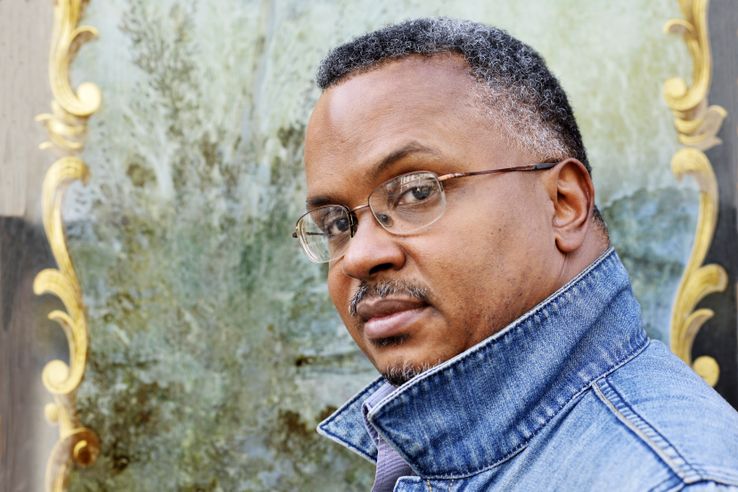 Jake Lamar
Jake Lamar
Photo by Ulf Andersen
ETBP: What inspired you to write Viper’s Dream?
JL: Viper's Dream was inspired by a confluence of interests and enthusiasms. I first outlined it as a novel in 2012. I had just finished writing Brothers in Exile and was reading a lot of Chester Himes, so the crime milieu in Harlem intrigued me.
I've loved jazz all my life and I had recently read of how the jazz baroness, Pannonica de Koenigswarter, had asked her guests at the Cathouse what their three wishes were. And finally, there's that mysterious aspect of fiction writing: the way characters just appear in your imagination and you feel compelled to bring them to life.
ETBP: How is writing for radio different than for the stage or for print?
JL: I could go on for many pages about this. But let me just take one aspect. Writing for the radio is like someone whispering to you in the dark. I wrote the radio play dialogue with that sense of intimacy in mind. I wrote with a different sort of sensitivity than I do when writing dialogue in a novel, where it is up to the reader to "hear" the voice of a character. And it was different from writing for the stage, where one can see an actor or actress as they deliver the lines. Writing for the radio feels uniquely intimate. Someone you do not see but are free to visualize is speaking to you. That's why I think of whispers in the dark.
ETBP: Did France Culture approach you about writing the series, or did you approach them with your idea for the project?
JL: I so enjoyed working with Laurence Courtois on the radio adaptation of Brothers in Exile that in 2015, I decided to take my outline for the novel of Viper's Dream and transform it into a radio script. I was greatly motivated by the idea that France Culture has the right to play practically any song you can name. Since the story is set in the jazz milieu of Harlem between 1936 and 1961, I thought the possibilities for using the music of that era as part of the narrative texture would make for a unique creative experience.
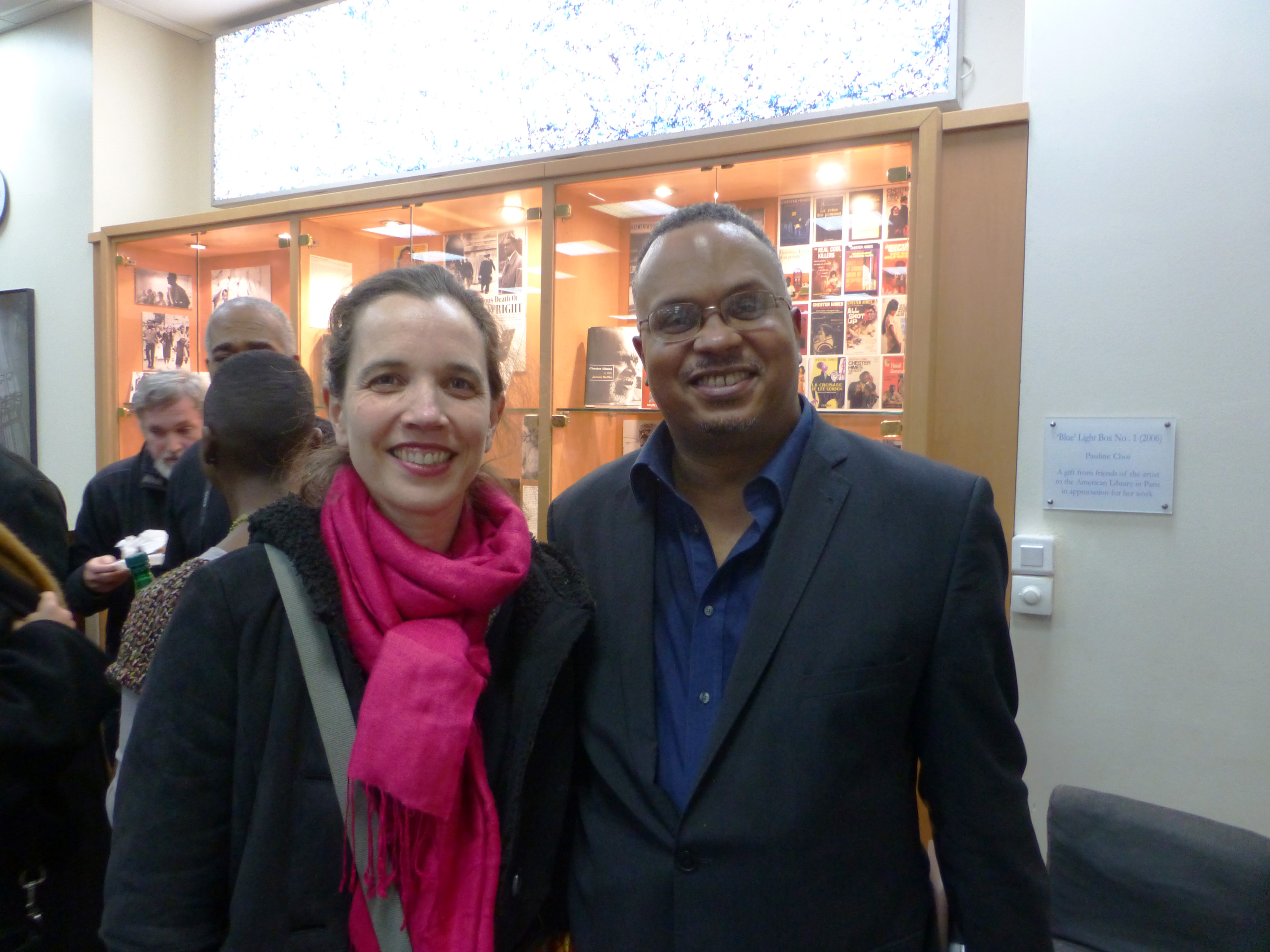 Laurence Courtois and Jake Lamar
Laurence Courtois and Jake Lamar
© Discover Paris!
ETBP: Did you receive a grant or other financial support for this project? If so, what organization(s) is / are funding it?
JL: I didn't seek a grant to write this piece. When I told Laurence my idea, she introduced me to Emmanuelle Chevrière, the producer of Le Feuilleton, the nightly radio fiction series, at France Culture. The producer told me to write a short synopsis, then the first episode, the "pilot" so to speak, of the 10-episode series. After a very long wait, I was informed that France Culture would buy the project, so I wrote the nine subsequent episodes on commission. It took a year and a half to write the script, which, at 223 pages, has the heft of a novel.
ETBP: What was required to adapt the script to Le Feuilleton's 24-minute format?
JL: I knew from the start that no episode could be longer than about 22 pages. It presented an exciting challenge. It required creative discipline, an imposed structure, like writing a sonnet.
ETBP: You’ve said that 50 actors worked on the drama and that 35 of them are of African descent. Director Laurence Courtois told us that it is not unusual to have so many actors work on a radio series and that she personally selected many of those who have roles in Viper's Dream. She said that many others came to the project through referrals from actors she chose. Did you help with the selection of the cast?
JL: I was not involved in the casting process. This is very much considered the director's domain, not the writer's. But I was excited to learn that actors I had worked with before would be among the cast.
Assane Timbo, who played Chester Himes in the radio adaptation of Brothers in Exile, plays Peewee (or Piwi, in French). Mexianou Medenou, who played James Baldwin in the radio version of Brothers in Exile, plays Pretty Paul Baxter in Viper's Dream. Cyril Guei, who read Baldwin onstage at the Théâtre du Rond Point, plays Pork Chop Bradley.
I also discovered Ludmilla Dabo, an astonishingly gifted actress and singer, who plays Yolanda "Yo-Yo" DeVray. Ludmilla recently portrayed Nina Simone at the Théâtre de la Ville, among all the other roles she is currently taking on in her blossoming career.
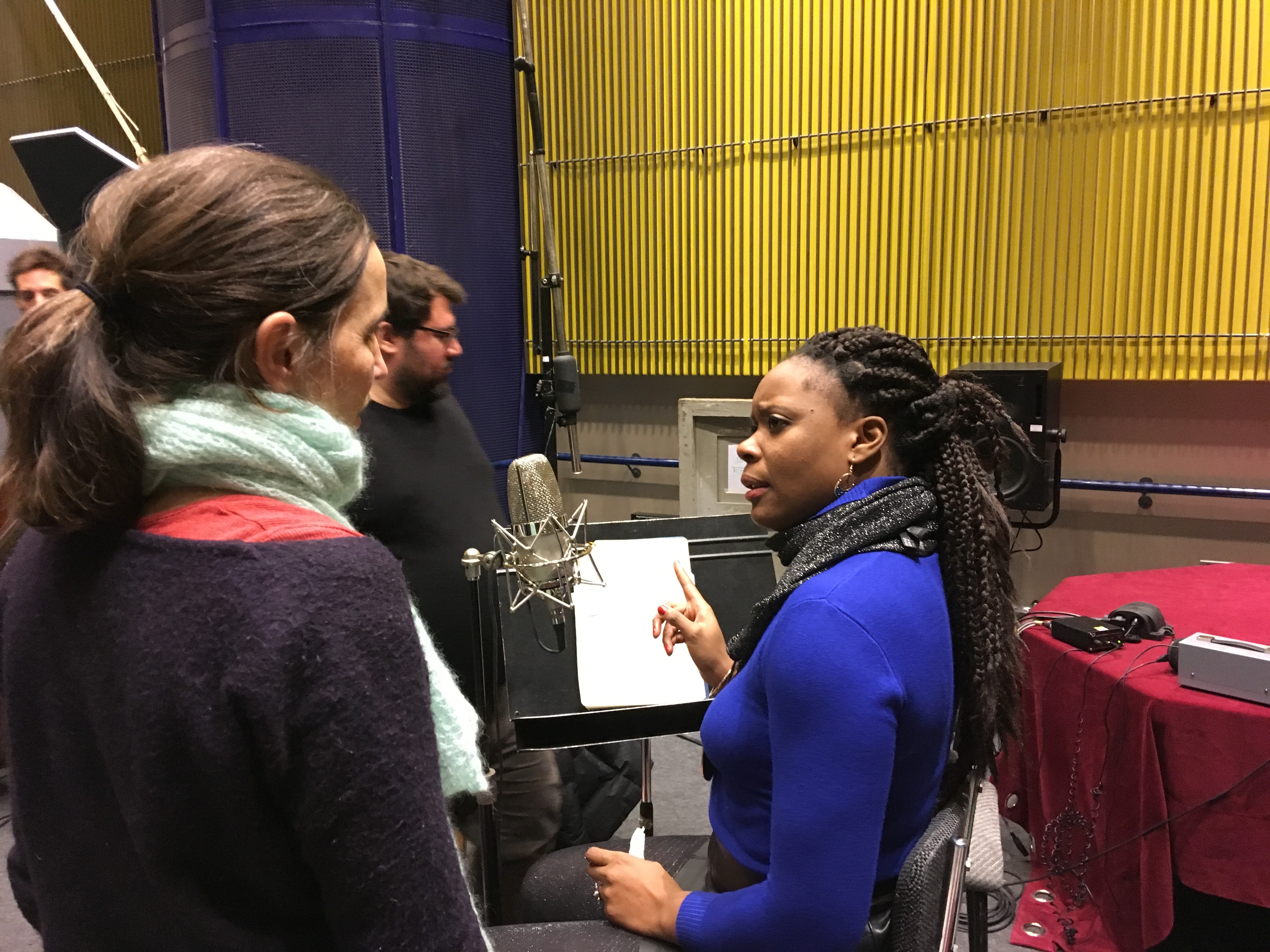 Laurence Courtois (left) and Ludmilla Dabo (right)
Laurence Courtois (left) and Ludmilla Dabo (right)
© Dorli Lamar
There are several black actors familiar from French television and cinema cast in key roles: Edouard Montoute as Buttercup Jones, Jean-Michel Martial as Gentleman Jack, Eric Ebouaney as the Preacher. The black French actress and author who goes by the name Viktor Lazlo plays Matilda.
And finally there is Tony Harrisson in the role of Clyde "Viper" Morton. Tony has the talent and charisma of a young Denzel Washington.
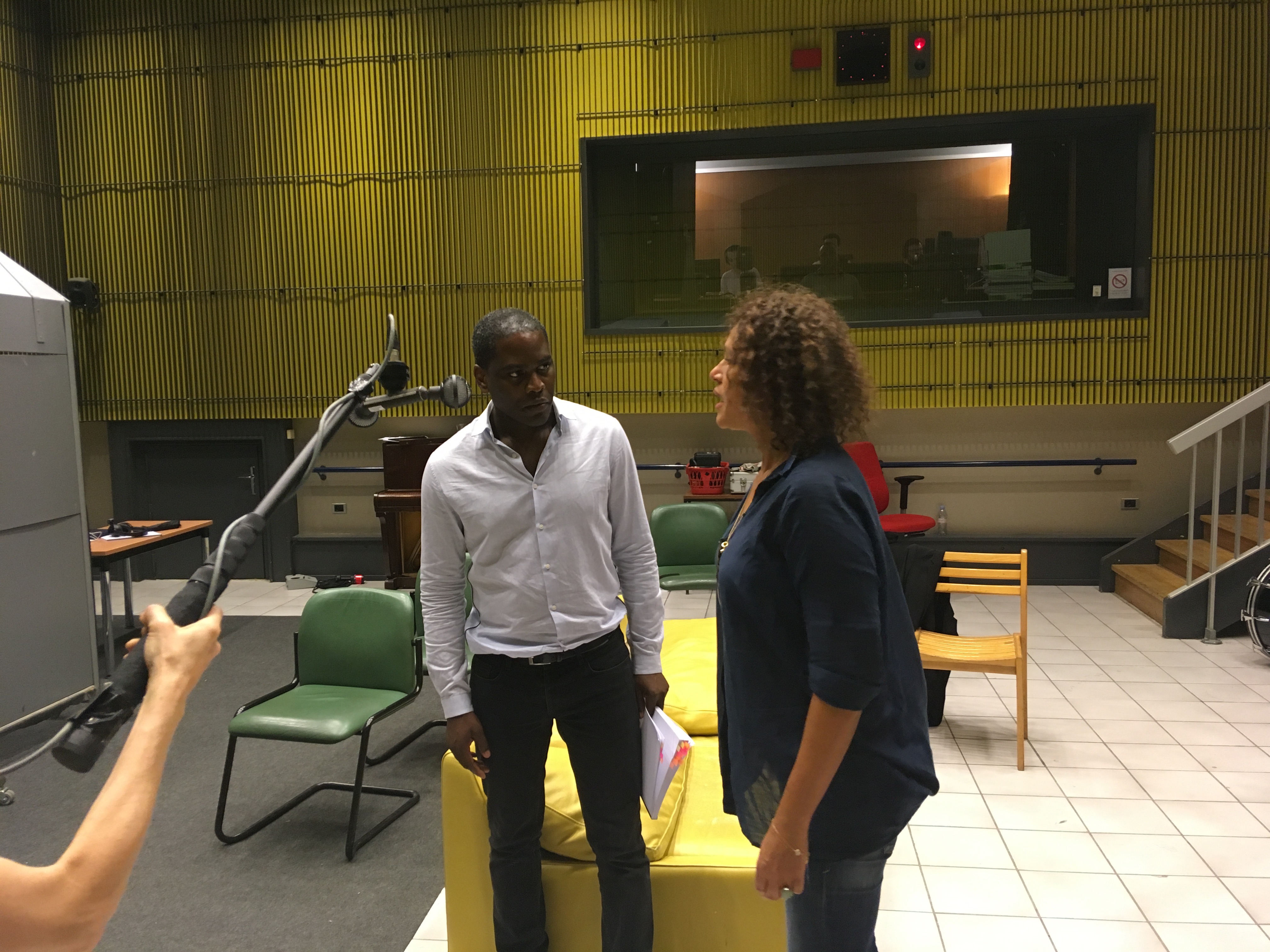 Tony Harrisson and Viktor Lazlo at the studio
Tony Harrisson and Viktor Lazlo at the studio
© Dorli Lamar
Viper and Yo-Yo are the star-crossed lovers at the center of the story. I am so grateful to have two such talented performers in these roles.
ETBP: How much of the cast's interest in working on Viper’s Dream was based on the story and how much was based on working with you (as a black writer)?
JL: I think their interest was sparked by the quality of the roles. They don't often see scripts with that many complex roles written for that many black interpreters. The fact that I'm an African-American author writing about a black-American milieu---the jazz world of Harlem---added to their enthusiasm. But I think it's mainly the juiciness of the parts that inspired them.
ETBP: What role did you play in the actual recordings?
JL: We recorded the series over 13 ten-hour days in October 2018. I was there almost the entire time, advising the actors on any questions they had regarding their characters, cultural references, historical fine points, etc.
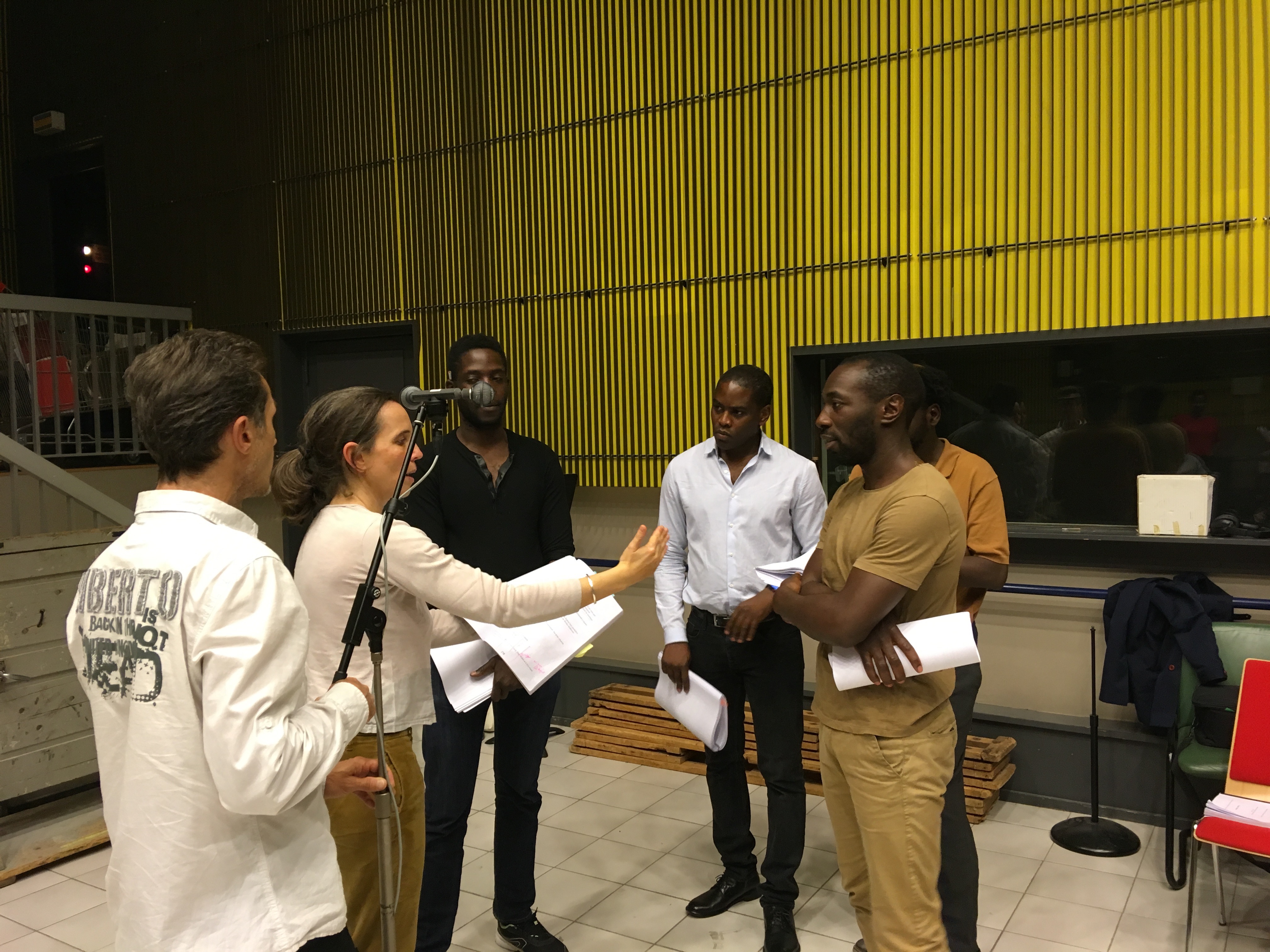 In the studio: (left to right) Laurence Courtois, Makita Samba, Tony Harrisson, Cyril Guei, and Assane Timbo
In the studio: (left to right) Laurence Courtois, Makita Samba, Tony Harrisson, Cyril Guei, and Assane Timbo
© Dorli Lamar
ETBP: How did you come up with Clyde “Viper” Morton as the main character?
JL: The birth of characters is one of the most mysterious aspects of fiction writing. Clyde arrived mysteriously in my imagination along with all the other fictional characters in the piece.
One thing that fascinates me about Clyde is that he has a sort of moral code. He is a principled marijuana dealer at war with unprincipled heroin dealers. He is genuinely in love with Yolanda. He is devoted to encouraging the evolution of jazz and wants to protect its artists from the scourge of heroin. He is also a cold-blooded killer.
I think I've always been intrigued by the image of the complicated gangster: Vito and Michael Corleone, Tony Soprano, Frank White in King of New York, Walter White in Breaking Bad, Stringer Bell in The Wire. Viper Morton is a criminal protagonist in that tradition.
ETBP: You’ve given a nod to the Paris jazz scene in the drama. Was this for the benefit of French audiences or would you have done this regardless?
JL: One of my ambitions in Viper's Dream was to capture the evolution of jazz between 1936 and 1961, which includes the explosion of bebop and the wave of black musicians who enlivened the Saint Germain scene in the late 1940s and '50s. Yo-Yo going to Paris fit into that vision.
ETBP: How did you select the music for Viper’s Dream?
JL: Since I was writing for radio, I approached Viper's Dream almost like a jazz opera. In the script, I was very precise about the music I wanted behind each scene. And since Radio France has the rights to just about everything, I could be specific in my suggestions.
But ultimately, the musical selections fall in the director's domain. I was not invited into the editing and sound mixing sessions. So I will only know when the series airs which of my musical propositions made it into the final cut.
ETBP: Talk about how the sound effects for the series were produced.
JL: This is another subject I could go on about for several pages. Let me just cite my single favorite sound effect. There are many party and nightclub scenes in Viper's Dream. When recording these big, busy crowd scenes, one inevitable sound would be the clink of ice cubes in cocktails. Recording over hours, it would be impossible to provide enough ice, which has a habit of melting. The brilliant sound technicians at Radio France use empty escargot shells in a glass of water to replicate the sound of ice cubes rattling in a cocktail. They sound exactly the same. Who knew?!
ETBP: Will the series be presented in French only?
JL: Right now, Viper's Dream has only been recorded in French. But my agent in New York has given the script to producers at Amazon's Audible Originals podcast enterprise. Fingers crossed.
ETBP: Will it be available for listening after the initial run?
JL: Yes, each episode of Viper's Dream will appear on the France Culture website immediately after the initial broadcast.
ETBP: Will you work Viper’s Dream into a novel, a script for a play, or a screenplay for film?
JL: I have indeed adapted the script of Viper's Dream into the novel that I had first envisioned. In France, the book will be published by Rivages Noir, but not until 2020.
Viper's Dream was translated into French by Dorli Lamar. It will air on France Culture's Le Feuilleton program Monday through Friday, March 4 - March 15, 2019 from 8:30 PM to 8:55 PM Paris time. Replays will be available on France Culture's Web site after each episode airs. Click HERE to access them.

 Our Walk: Black History in and around the Luxembourg Garden - Click here to book!
Our Walk: Black History in and around the Luxembourg Garden - Click here to book!